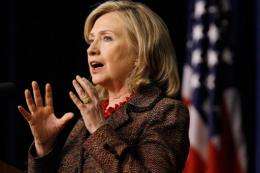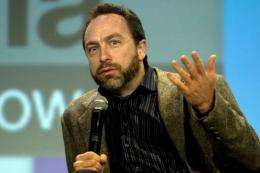US Secretary of State Hillary Clinton addresses an event to launch the US International Strategy for Cyberspace in Washington, DC in May 2011. Officials from 60 countries including Hillary Clinton, Wikipedia co-founder Jimmy Wales and Chinese technology firms gather in London Tuesday to discuss the benefits and security risks of cyberspace.
Officials from 60 countries including Hillary Clinton, Wikipedia co-founder Jimmy Wales and Chinese technology firms gather in London Tuesday to discuss the benefits and security risks of cyberspace.
The US Secretary of State is among up to 900 delegates attending the two-day conference, although few expect unity from participants who often disagree on what exactly the opportunities and challenges presented by cyberspace are.
The broad agenda covers everything from access to the Internet, the economic impact of cyberspace, its social benefits -- including fuelling democracy movements such as the Arab Spring -- and cyber crime and security.
Commentators have expressed scepticism that the varying interests of Europe and the United States on the one hand and Russia and China on the other can be reconciled, particularly on issues such as freedom of speech online.
China is also a source of tension, being blamed for many of the cyber attacks that are troubling world governments, including a massive global spying campaign identified in August. Beijing strongly denied any involvement.
"International diplomacy like this among states and private stakeholders is important and will bring needed attention to these issues," Adam Segal and Matthew Waxman of the Council on Foreign Relations wrote recently.
"But the London summit is also likely to expose major faultlines, not consensus, on the hardest and most significant problems."
The analysts noted that the security priority of Western states was to protect their networks from attacks, while China and Russia emphasised the security of information, which requires controlling content.
Jimmy Wales, co-founder of Wikipedia, speaks in Jerusalem in 2009. Officials from 60 countries including Hillary Clinton, Wales and Chinese technology firms gather in London Tuesday to discuss the benefits and security risks of cyberspace.
British officials insist they have no ambition to create a treaty or new laws, particularly on the issue of international security, which will be discussed behind closed doors on Tuesday afternoon.
They say the meeting is simply about "starting a debate" between interested parties across the world, and note that several countries have already agreed to host a follow-up conference within the next 12 to 18 months.
Cyber security has already been discussed under the auspices of the United Nations and NATO, while the United States and Australia agreed in September that a cyber attack in either country would trigger a joint response.
But officials believe this is the first conference of its kind to look at all aspects of cyberspace with input from wide range of players, including a group of 25 young people who will explain what the Internet means for them.
Other participants include Internet pioneers Google, Facebook, Microsoft and Chinese video sharing site Tudou.com, as well as cyber crime agencies, computer security firms and government representatives from Russia to South Korea.
Iran has not been invited, despite being the target of the malicious Stuxnet worm last year which attacked its uranium enrichment plant in the central city of Natanz, prompting Tehran to point the finger at arch-foes the US and Israel.
Foreign Secretary William Hague, who will host the meeting, said it would "discuss ideas and expected behaviour in cyberspace".
The idea was to "bring together the major actors in cyberspace and to launch an inclusive dialogue on how, collectively, we should respond to the challenges and opportunities which the development of cyberspace presents", he said.
(c) 2011 AFP

























